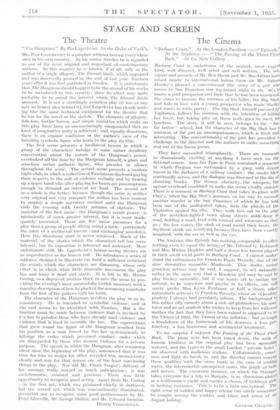STAGE AND SCREEN The Theatre
"The Hangman." By Par Lagerkvist. At the Duke of York's.
Mn. Pent LAGERKVIST is a prophet without honour everywhere save in his own country. In his native Sweden he is regarded as one of the most original and important of contemporary authors. In this country he is known, if at all, only as the author of a single allegory, The Eternal Smile, which appeared and was deservedly praised at the end of last year, fourteen years after it was first published in Sweden. It is unfortunate that The hangman should happen to be the second of his works to be introduced to this country, since its effect may quite probably be to annul the interest which The Eternal Smile aroused. It is not a startlingly pointless play (it has at any rate an honest idea behind it), but Lagerkvist has clearly noth- ing like the same technical equipment for the theatre that he has for the novel or the sketch. The elements of allegory, folk-lore, Gothic horror, and simple narrative which make up this play have been so unconvincingly compounded that no kind of imaginative unity is achieved; and, equally disastrous, there is an organic confusion in the author's view of the brooding symbolic figure who lends to the play its title.
The first scene presents a mediaeval tavern in which a group of the characters indulge in some rather desultory .conversation about the' nature of the Hangman's power, overlooked all the time by the Hangman himself, a glum and somehow rather pathetic figure,: who presides in silence throughout the scene. The second scene presents a modern night-club, in which a collection of Paseistsare disclosed paying their respects to the cult of violence verbally and by beating up a negro band who after playing fOr hours are presumptuous enough to demand an interval for food. The second act as a whole is the better, because though the satire is neither very original nor very compact the author has been content to employ a simple narrative method until the Hangman ends the evening with twenty minutes of rhetoric. • The material of the first scene—the Hanerman's occult power—is intrinsically of much greater interest, but it is most inade- quately presented. There are few worse premisses for a "play than a group of people sitting round a table—particularly the table of a mediaeval tavern—and exchanging anecdotes. Here this disastrous start is never retrieved. Much of the material of the stories 'which the characters tell has some interest, but its exposition is laboured and awkward. More 'unfortunate still, Mr. Lagerkvist's labour-saving devices are as unproductive as his honest toil. He introduces a series of tableaux, designed to illustrate (in itself a sufficient criticism) the events which the characters are discussing, whose only effect is to check what little dramatic movement the play has and leave it dead and static. It is left to Mr. Marius Goring, as a depraved armless thief,. to save the scene by pro- viding the evening's most successfully Gothic moments with a macabre description of how he plucked the screaming mandrake from the foot of the gallows with his teeth.
The character of the Hangman involves the play in an in- consistency. He is. intended to symbolise violence, and at the end seems to be identified with Fascism. But a dis- tinction must be made between violence that is invoked by ne law to penalise those who have already used violence and violence that is used to override the law. The superstitions that grew round the figure of the Hangman resulted from his position as a man forced by the law systematically to infringe the codes which governed conduct—codes which are disregarded by those who assume violence for a private purpose. The speech in which the Hangman, after remaining silent since the beginning of the play, announced that it was time for him to resign his office revealed this inconsistency clearly and was for that reason one of the least convincing things in the play. Nor did Mr. Frank Vosper's delivery of his message really reward so much anticipation ; it was melodramatic, strained and precious. There was little opportunity to recognise good acting—apart from Mr. Goring —in the first act, which was produced chiefly in . darkness, but the second act, which was conventionally illuminated, permitted one to recognise some. good performances by Mr. Peter Glenville, Mr. George Skillan, and Mr. Edward Swinton.
DEREK VEIISCIIOYLE.


























































 Previous page
Previous page